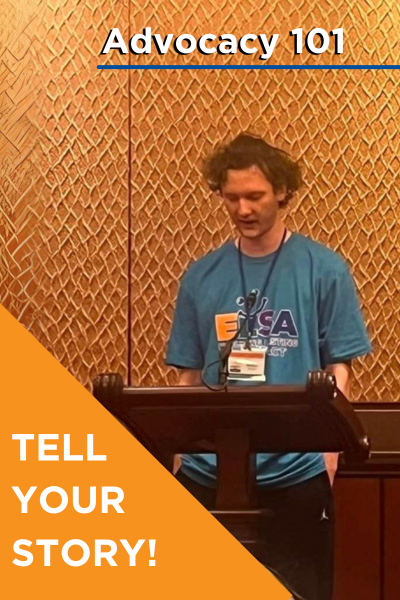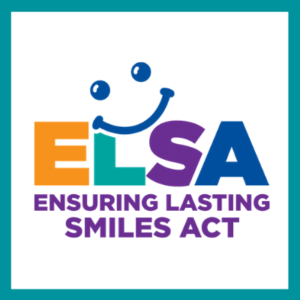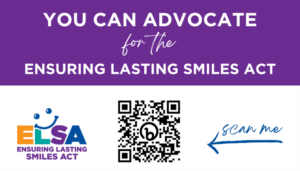Make Your Story Known For ELSA
Dealing with a rare condition like ectodermal dysplasia can be very challenging, especially when it comes to navigating the healthcare system. The National Foundation for Ectodermal Dysplasias (NFED) is here to help you get the necessary care. One effective way to achieve this is through legislative advocacy and sharing your story.
Using advocacy as a tool can help you create legislative change that can impact your family and many others. A prime example is the Ensuring Lasting Smiles Act (ELSA), which would ensure insurance coverage for medically necessary treatments for ectodermal dysplasias and other congenital anomalies. Let’s take a closer look at legislative advocacy and how you can make a difference.
Why Advocacy Matters
Personal stories are unique and impactful. Your story, a patient’s story, or a loved one’s story is the most powerful tool for creating change in each aspect of our daily lives. These stories not only have the capability to resonate within the halls of Congress to inspire and change policy, but they can also create change that extends far beyond D.C. into classrooms, providers’ offices, and relationships.
Find Your Voice: Through Advocacy

Legislative advocacy allows you to influence the laws that impact our community directly. It might sound intimidating, but with the NFED’s resources and a little know-how, you can become a powerful voice for change. Your story is a powerful tool for ELSA advocacy. Think about the challenges you’ve faced due to limited insurance coverage for your medically necessary medical and dental treatments.
How did it impact your daily life? Did it cause emotional or financial strain? Craft a story highlighting these struggles you can share with legislators, media outlets, or even social media. By making your experience relatable, you can connect with others and raise awareness about the importance of ELSA for all.
Remember, your voice matters! By getting involved in legislative advocacy with the NFED, you can help ensure a brighter future for yourself and others.
Legislative Advocacy Day on Capitol Hill FAQs
Anyone can advocate for ELSA! Whether you’re an experienced advocate or just starting out, advocates of all ages and backgrounds are welcome and encouraged to do so. Patients’, providers’, and individual stories work hand-in-hand to create a full picture of why ELSA is common-sense legislation that needs to be passed.
Yes, we strongly encourage children and youth of all ages to attend Advocacy Day with their families. Children’s and advocates’ personal stories are the most powerful tool to garner support for ELSA. Legislators and their staff are delighted to meet and hear from child and youth advocates. Youth advocates often inspire the legislative offices to support ELSA. We will also provide a brief training geared toward youth advocates.
Yes, we strongly encourage and welcome care providers and their families to join patient advocates on Hill Day. Patient and provider stories work hand-in-hand to provide legislators with a complete picture of why they should work to help underserved communities. Raising our voices together is the most powerful tool we have to promote change.
Yes, the NFED will hold virtual training approximately one week before the in-person event, and in-person training will be held the day before Capitol Hill Day. The training will explain how to access your legislative schedule, advocate successfully, and answer any questions you may have. We will also provide examples of mock meetings to explain better what should and shouldn’t be shared in legislative meetings.
Usually, a minimum of three meetings (two Senators and one Representative from your district) are scheduled for advocates. There may be up to six meetings scheduled if you are grouped with another state. Each legislative meeting lasts between 15-20 minutes on average, depending on the number of advocates present.
The Capitol Hill buildings are located several blocks from each other, and there will be a lot of walking during the event. The NFED will provide t-shirts to wear on Hill Day. We encourage you to wear comfortable shoes and casual clothing. Nothing offensive or political should be worn to the Hill. We also suggest you review the full list of prohibited items you cannot bring to Capitol Hill.
Prohibited Item List
The NFED plans to reserve at least one room on Capitol Hill for advocates to take breaks and relax between legislative meetings. Cafeterias with a wide selection of food choices are available on both the House and Senate sides of Capitol Hill. We will list locations where food and beverages are available during training.
If you stay at the Grand Hyatt Washington D.C., we will provide bus transportation to and from Capitol Hill. All participants will leave on the bus together at a specified time from the hotel and when we return from Capitol Hill (at a time to be announced later).
The NFED will provide a t-shirt, tote bag, name tag, training supplies, legislative schedules, snacks, and bottled water. Advocates should prepare their personal stories and print six copies to leave with the legislative offices. Please keep these stories to one page. Feel free to add pictures as appropriate.
We always try to schedule meetings directly with Senators and Representatives. If they are unavailable, we will schedule a meeting with a member of their staff. These staffers are responsible for researching, reviewing, and recommending support for legislation. These meetings are the first step to building a relationship with your legislative offices.
Both the virtual and in-person training are mandatory, and you must attend to receive your legislative meeting schedule, t-shirt, and resources. (Please email Becky Abbott if you have any questions in regards to attending.)
We encourage you to visit the NFED’s Advocacy Resources page. We have provided some materials and resources to help you advocate and prepare for meetings with your legislators. We have also included sample letters from advocates from the ectodermal dysplasias, cleft lip/palate, and congenital cataracts community to help you write your story. You can also find an Advocacy Letter Template with the ELSA logo, which you can use to add your story and print it off for your legislative meetings. If you are attending Hill Day, print six copies and bring them with you.
The NFED advocacy team will take care of scheduling your meetings and ensure you have all the information you need to find each location. The NFED staff and volunteers will be readily available throughout the day in the ADA Townhouse near the House side and a reserved room on the Senate side to answer questions and guide you to your designated meeting rooms. Relax, the NFED team is here to help! If you have any concerns about finding your meeting locations, don’t hesitate to ask a staff member at the registration desk or after advocacy training. If you have questions in between meetings, you can ask a legislative staff member for guidance and directions.
Additionally, you can use these maps to familiarize yourself with the layout of Capitol Hill. Capitol Hill Map with Visitors Center
Stand Together NFED Advocacy Conference 2024 Interactive Google Map
The NFED has many to help you get involved with ELSA advocacy. Here are a few ways you can make a difference:
- Learn about ELSA: Visit our ELSA Fact Sheet to understand the specifics of the bill and its potential impact.
- Share Your Story: Personal stories are powerful tools for advocacy. Share your experiences and the challenges you’ve faced with insurance companies. You can share your story with legislators, the media, or even social media.
- Stay Informed: Sign up for the NFED’s email list to stay updated on the latest developments with ELSA and other legislative issues.
- Ask Your Family, Friends, Colleagues, Providers, Teachers, and Community to Join: We’ve also created a shareable business card for advocates to give to anyone who would like to join our advocacy efforts. The card includes a QR code to our easy-to-use web tool, where supporters can advocate for ELSA directly with their legislators in a matter of minutes. Print them or save a copy on your phone to share with everyone who will advocate for ELSA.
Remember, your voice matters! By getting involved in legislative advocacy with the NFED, you can help ensure a brighter future for yourself and others living with congenital anomalies.
Advocacy Day on Capitol Hill is a life-changing day that everyone, young or old, should participate in. I’ve had the honor of hearing from multiple first-time advocates that they felt empowered to be on the Hill and that they never thought they would have the chance to meet with lawmakers and share their stories. Advocating on Capitol Hill is about something much bigger than ourselves.
When you share your story for ELSA you have the potential not only to help yourself, your loved one, or your patient, you are raising your voice to help an underserved community. The process may seem intimidating, but it’s a fun and exciting day. If you feel apprehensive or need any guidance in writing your story or have any questions, feel free to contact me at any time. July will be here soon and we cannot wait to spend an empowering Day on the Hill with all of you!

